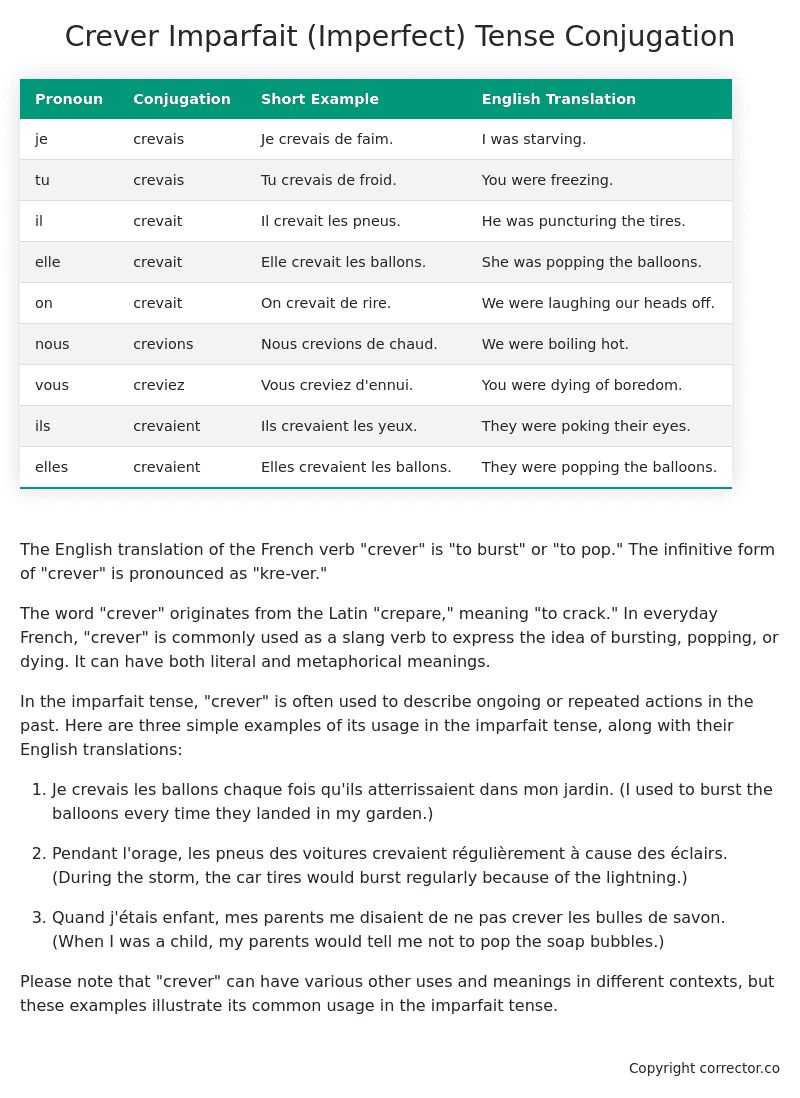Imparfait (Imperfect) Tense Conjugation of the French Verb crever
Introduction to the verb crever
The English translation of the French verb “crever” is “to burst” or “to pop.” The infinitive form of “crever” is pronounced as “kre-ver.”
The word “crever” originates from the Latin “crepare,” meaning “to crack.” In everyday French, “crever” is commonly used as a slang verb to express the idea of bursting, popping, or dying. It can have both literal and metaphorical meanings.
In the imparfait tense, “crever” is often used to describe ongoing or repeated actions in the past. Here are three simple examples of its usage in the imparfait tense, along with their English translations:
-
Je crevais les ballons chaque fois qu’ils atterrissaient dans mon jardin.
(I used to burst the balloons every time they landed in my garden.) -
Pendant l’orage, les pneus des voitures crevaient régulièrement à cause des éclairs.
(During the storm, the car tires would burst regularly because of the lightning.) -
Quand j’étais enfant, mes parents me disaient de ne pas crever les bulles de savon.
(When I was a child, my parents would tell me not to pop the soap bubbles.)
Please note that “crever” can have various other uses and meanings in different contexts, but these examples illustrate its common usage in the imparfait tense.
Table of the Imparfait (Imperfect) Tense Conjugation of crever
| Pronoun | Conjugation | Short Example | English Translation |
|---|---|---|---|
| je | crevais | Je crevais de faim. | I was starving. |
| tu | crevais | Tu crevais de froid. | You were freezing. |
| il | crevait | Il crevait les pneus. | He was puncturing the tires. |
| elle | crevait | Elle crevait les ballons. | She was popping the balloons. |
| on | crevait | On crevait de rire. | We were laughing our heads off. |
| nous | crevions | Nous crevions de chaud. | We were boiling hot. |
| vous | creviez | Vous creviez d’ennui. | You were dying of boredom. |
| ils | crevaient | Ils crevaient les yeux. | They were poking their eyes. |
| elles | crevaient | Elles crevaient les ballons. | They were popping the balloons. |
Other Conjugations for Crever.
Le Present (Present Tense) Conjugation of the French Verb crever
Imparfait (Imperfect) Tense Conjugation of the French Verb crever (You’re reading it right now!)
Passé Simple (Simple Past) Tense Conjugation of the French Verb crever
Passé Composé (Present Perfect) Tense Conjugation of the French Verb crever
Futur Simple (Simple Future) Tense Conjugation of the French Verb crever
Futur Proche (Near Future) Tense Conjugation of the French Verb crever
Plus-que-parfait (Pluperfect) Tense Conjugation of the French Verb crever
Passé Antérieur (Past Anterior) Tense Conjugation of the French Verb crever
Futur Antérieur (Future Anterior) Tense Conjugation of the French Verb crever
Subjonctif Présent (Subjunctive Present) Tense Conjugation of the French Verb crever
Subjonctif Passé (Subjunctive Past) Tense Conjugation of the French Verb crever
Subjonctif Imparfait (Subjunctive Imperfect) Tense Conjugation of the French Verb crever
Subjonctif Plus-que-parfait (Subjunctive Pluperfect) Tense Conjugation of the French Verb crever
Conditionnel Présent (Conditional Present) Tense Conjugation of the French Verb crever
Conditionnel Passé (Conditional Past) Tense Conjugation of the French Verb crever
Conditionnel Passé II (Conditional Past II) Tense Conjugation of the French Verb crever
L’impératif Présent (Imperative Present) Tense Conjugation of the French Verb crever
L’impératif Passé (Imperative Past) Tense Conjugation of the French Verb crever
L’infinitif Présent (Infinitive Present) Tense Conjugation of the French Verb crever
L’infinitif Passé (Infinitive Past) Tense Conjugation of the French Verb crever
Le Participe Présent (Present Participle) Tense Conjugation of the French Verb crever
Le Participe Passé (Past Participle) Tense Conjugation of the French Verb crever
Struggling with French verbs or the language in general? Why not use our free French Grammar Checker – no registration required!
Get a FREE Download Study Sheet of this Conjugation 🔥
Simply right click the image below, click “save image” and get your free reference for the crever imparfait tense conjugation!

Crever – About the French Imparfait Tense
NOTE: To take a deep dive into all the French tenses then see our article on Mastering French Tense Conjugation.
Formation of the Imparfait Tense
For regular -er verbs:
For regular -ir verbs
For regular -re verbs
Common Everyday Usage Patterns
Description of Past Habits
Background Information
Mental and Emotional States
It’s employed to express emotions, thoughts, or physical sensations in the past. For example: “J’étais content quand il est arrivé.” (I was happy when he arrived.)
Ongoing Actions
Points to Note About the Imparfait Tense
Passé Composé vs. Imparfait
Conditional
Si Clauses
Narration
I hope you enjoyed this article on the verb crever. Still in a learning mood? Check out another TOTALLY random French verb imparfait conjugation!


